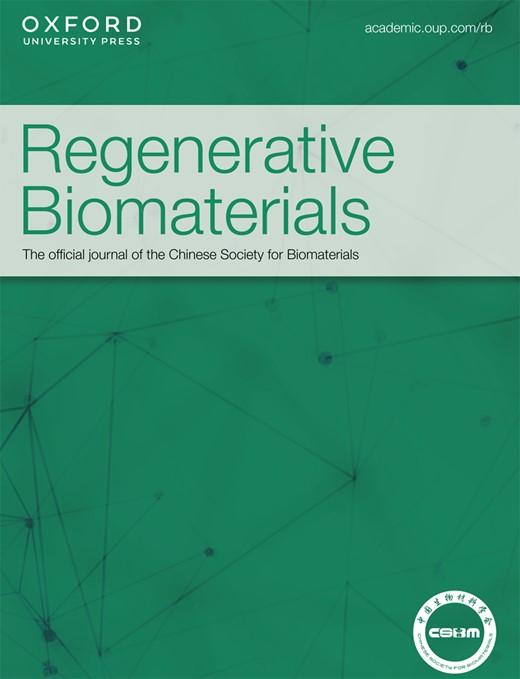Effects of serum proteins on corrosion rates and product bioabsorbability of biodegradable metals
IF 5.6
1区 医学
Q1 MATERIALS SCIENCE, BIOMATERIALS
引用次数: 0
Abstract
Corrodible metals are the newest kind of biodegradable materials and raise a new problem of the corrosion products. However, the removal of the precipitated products has been unclear and even largely ignored in publications. Herein, we find that albumin, an abundant macromolecule in serum enhances the solubility of corrosion products of iron in blood mimetic Hank’s solution significantly. This is universal for other main biodegradable metals such as magnesium, zinc and polyester-coated iron. Albumin also influences corrosion rates in diverse trends in Hank’s solution and normal saline. Based on quantitative study theoretically and experimentally, both the effects on corrosion rates and soluble fractions are interpreted by a unified mechanism, and the key factor leading to different corrosion behaviors in corrosion media is the interference of albumin to the Ca/P passivation layer on the metal surface. This work has illustrated that the interactions between metals and media macromolecules should be taken into consideration in the design of the next-generation metal-based biodegradable medical devices in the formulism of precision medicine. The improved Hank’s solution in presence of albumin and with a higher content of initial calcium salt is suggested to access biodegradable metals potentially for cardiovascular medical devices, where the content of calcium salt is calculated after consideration of chelating of calcium ions by albumin resulting in the physiological concentration of free calcium ions.血清蛋白对可生物降解金属的腐蚀速率和产品生物可吸收性的影响
可腐蚀金属是一种最新的可生物降解材料,并提出了腐蚀产物的新问题。然而,如何去除沉淀产物一直是个未知数,甚至在很多出版物中被忽略。在这里,我们发现血清中含量丰富的大分子白蛋白能显著提高铁的腐蚀产物在血液模拟汉克溶液中的溶解度。这对于其他主要的可生物降解金属,如镁、锌和聚酯涂层铁也是一样。白蛋白在 Hank's 溶液和生理盐水中也会以不同的趋势影响腐蚀率。基于理论和实验的定量研究,白蛋白对腐蚀速率和可溶性组分的影响被解释为一种统一的机理,而导致腐蚀介质中不同腐蚀行为的关键因素是白蛋白对金属表面 Ca/P 钝化层的干扰。这项工作说明,在精准医疗的配方中,设计下一代基于金属的可生物降解医疗器械时应考虑金属与介质大分子之间的相互作用。考虑到白蛋白对钙离子的螯合作用导致游离钙离子的生理浓度,钙盐的含量是根据白蛋白对钙离子的螯合作用计算得出的。
本文章由计算机程序翻译,如有差异,请以英文原文为准。
求助全文
约1分钟内获得全文
求助全文
来源期刊

Regenerative Biomaterials
Materials Science-Biomaterials
CiteScore
7.90
自引率
16.40%
发文量
92
审稿时长
10 weeks
期刊介绍:
Regenerative Biomaterials is an international, interdisciplinary, peer-reviewed journal publishing the latest advances in biomaterials and regenerative medicine. The journal provides a forum for the publication of original research papers, reviews, clinical case reports, and commentaries on the topics relevant to the development of advanced regenerative biomaterials concerning novel regenerative technologies and therapeutic approaches for the regeneration and repair of damaged tissues and organs. The interactions of biomaterials with cells and tissue, especially with stem cells, will be of particular focus.
 求助内容:
求助内容: 应助结果提醒方式:
应助结果提醒方式:


